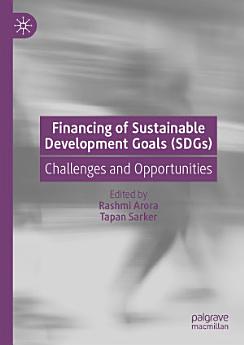Financing of Sustainable Development Goals (SDGs): Challenges and Opportunities
About this ebook
Foreword to Financing of the Sustainable Development Goals (SDGs): Challenges and Opportunities
Saleem H. Ali
As we approach the 2030 milestone that was set forth by the United Nations to attain seventeen key development goals, financing remains the ultimate challenge to their attainment. International conflicts have further stretched public sector discretionary spending on development and global uncertainty on economic growth has stymied private sector investment in a range of key infrastructure projects. At this pivotal moment, Arora and Sarker have assembled a timely anthology of leading experts from both the Global North and South to both evaluate past performance as well as project possible solutions to address the financing gap.
The twelve contributing chapters span a range of geographies as well as themes around the SDGs. An impressive feature of this volume is its willingness to engage with multidimensional aspects of the SDG agenda beyond just the usual multilateral donor’s space. They also cover key aspects of development from climate financing to fintech and methodologies for evaluating impact. This panoramic coverage makes the book particularly well suited for courses on sustainable development as well as for practitioners to educate themselves about ways to mobilize finance.
Having served on the Scientific and Technical Advisory Panel (STAP) of the Global Environment Facility (GEF) for four years I had a chance to review a range of large proposals with multiple financing sources submitted to the GEF Trust Fund administered by the World Bank. I had a chance to observe the ways in which financing was patched together for many projects to allow for upscaling. Yet often there were still major gaps or synergies could not be realized across sectors because of the way the funding was delineated.
This book will help to address many of these challenges with fresh ideas from experienced academics and practitioners. It has the potential for making a lasting impact on the global development agenda.
Saleem H. Ali
Member of the United Nations International Resource Panel
Chair and Distinguished Professor, Department of Geography, University of Delaware, USA
About the author
Rashmi Arora is an Associate Professor in Development Economics, School of Social Sciences, University of Bradford, Bradford, United Kingdom.
Tapan Sarker is Professor of Finance & Associate Head of School (Outreach, Engagement & International), School of Business, University of Southern Queensland, Australia.





